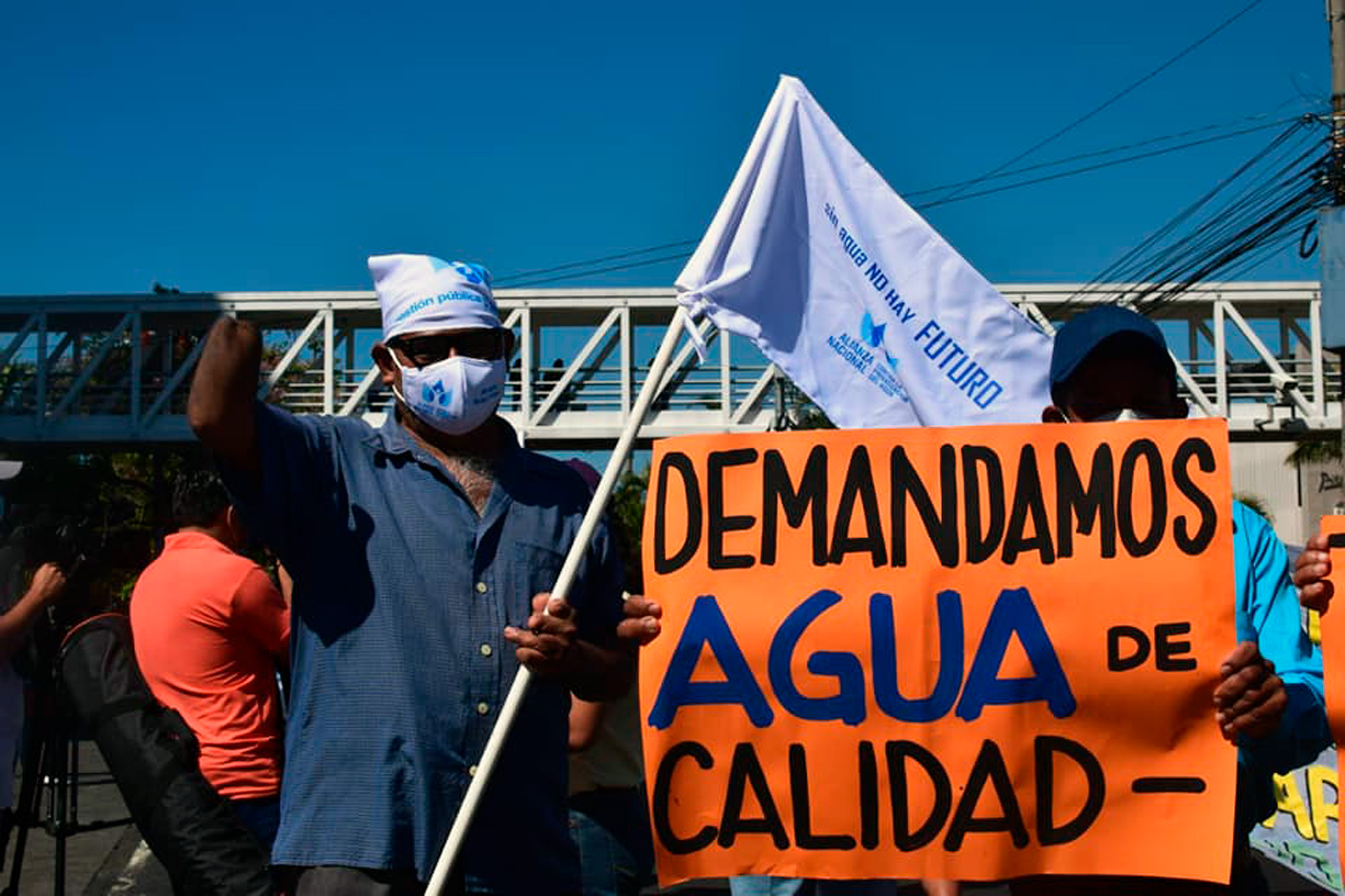Water access in Guatemala and El Salvador: human right or bussiness to the highest bidder
By Andina Ayala, Nancy Hernández and Omar Martínez
Edition and traduction: Daniela Sanchez Lemus
There are no sanctions or penalties for those who exploit and pollute it. Without a law that prioritizes social and human interests, water is left to the highest bidder.
The human right to water was recognized in 2010 by the United Nations as an essential right to exercise other rights. At this point, the water realities between Guatemala and El Salvador could begin to diverge.
President Nayib Bukele and his government of “new ideas” presented an initiative on June 18. A discussion in El Salvador began in 2006. In Guatemala, there are more than a dozen water law proposals because the issue has been discussed since 1990, the last time, the one that seemed to go seriously was in 2016, it fell apart because society does not want to give up its human right to water to the business sector.
Guatemala, the dreaded privatization of water
Guatemala was never so ready to discuss the water law as in 2016 and 2017. As a result of a strong social and community participation, a law initiative, number 5070, was produced.
Lawyer Lis Pérez relates that those months were of unprecedented democratic participation because there were consultations with the population, discussion tables and forums. The facilities of the San Carlos University -the only public institution at this level- were used to carry out dissemination and consensus processes.
The unorganized population, civil society and rural communities had agreed on something very important: water is a human right.
The demonstration for water that was born from complaints in different districts in April 2016, infected the thousands of people who do not have access to drinking water in the capital. That social clamor and demand was coordinated through the Social and Popular Assembly (ASP) who showed with alarming data, such as that in Guatemala 97% of the water sources are contaminated, claim and agglutinate impoverished urban population that also does not have the service.
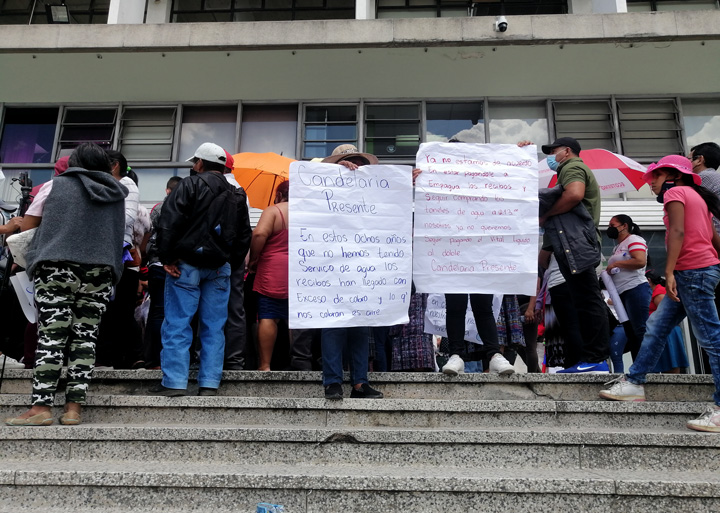
Several groups protest in Guatemala city.
Economic interests over the human right to water
The ASP raised the issue of contamination, scarcity and the appropriation of water sources by businessmen and farmers; the communities particularly complained about the diversion of rivers, leaving populations in drought: “Sugar cane and oil palm alone consumed 61 % by 2010, and banana, plantain and melon, 22 %, in which cases the major source used are rivers. Sugarcane, oil palm and banana consumed between 55 and 63% of the water used by economic activities in general in 2010. Meanwhile, water extraction for domestic use is only about 3 %.”
The organizations elaborated a water law proposal, number 50-70, which “in terms of substance was a counterpart proposal to more than 20 law initiatives that were already in the Guatemalan Congress and that could be reactivated at any time. These were harmful to the natural resource and the human right to water,” said Lis Perez.
After attempts to mutilate Initiative 5070, the issue was put on hold. In September 2020, Francisco Gómez, who was involved in the proposal, said in an interview via Facebook that based on the law and collective discussions of civil society, the unrenounceable points have been updated, that is to say, the parameters with which any other law proposal that reaches the Legislative Body will be analyzed:
“Initiative 5070, was a proposal that collectives, organizations, communities and indigenous authorities worked on. The relevance is that these are points that are not negotiable, that is to say, we cannot go below this, it is a position from the people.
Water for whom?
For whom it is and how it will be distributed, this will continue to be a relevant issue and at the same time of concern for the organized social sector.
For lawyer Lis Perez: “The key point is that, if a water law is activated, so are the others. The 5070 has not advanced because it has the conception of the people, because water is an element of life or subject of rights. While the other perspective is water as a commodity and an object of profit”.
An attempt was made to interview Congressman Julio Lainfiesta, current president of the environmental commission of the Guatemalan Congress, as this commission is the first filter of the law initiatives, but no response was obtained from him.
José Chic, advisor to the independent congressman Aldo Dávila, recalls that in 2016 the demonstrations for water, made possible not only the entry of initiative 5070 but of 13 other law initiatives: “To counteract the only initiative that proposed to sanction with one million Quetzales to those who were proven to be diverting rivers. It also proposes that the Public Prosecutor’s Office or judges should not dismiss a complaint of illegal appropriation, contamination or diversion of water, without it being heard by a judge”.
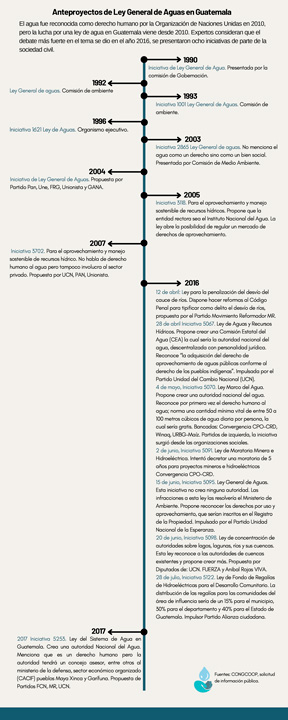
The business sector has used any type of artifice to defend its interests
“During the 2016 dialogues, an extraordinary commission on water resources was formed, -currently it is not active- but at that time the manager of the Association of Electric Power Generators (AGET), said: we do not have to pay for water, why are we going to pay for something that only passes through our lands. We even help and contribute to clean it with the energy generation process”.
Another fear expressed by social organizations and communities is that, with a water law in favor of the private sector, the diversion of rivers will be legalized.
“There is a risk that all the river diversions that have occurred up to now will be legalized and give the right of ownership to the sugar mills, to the palm trees, to all those companies and even to the hydroelectric plants,” reflected Chic.
Will a consensus be reached?
Until 2019, the head of the environmental and ecology commission of the Congress of the Republic had been someone close to the sugar cane producers, the most powerful economic activity in Guatemala, according to an investigation by the media El Faro and el diario.es, “in Guatemala, 12 sugar mills act as an oligopoly, a cartel with deep political connections and whose power is often resented by the communities in the countryside”.
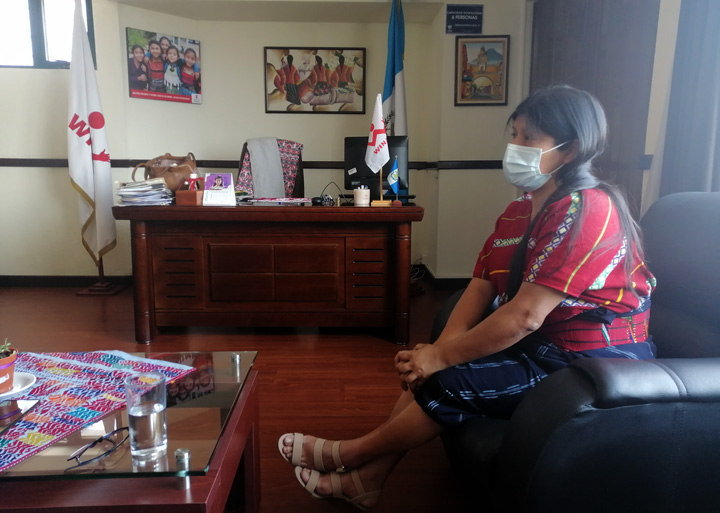
Sonia Raguay, congresswoman of Guatemala’s parlament.
The current panorama is not far from these interests, according to Congresswoman Sonia Raguay of the Winaq Political Movement party: “There are business interests trying to move a water law, and not all sectors are called for a discussion of such importance as the water law. Last year there were reactions from indigenous peoples’ organizations of rejection first of all because of the form”.
For the legislator, the country has advanced in defining that water is a human right and not, as the business community sees it, something that can be exploited. “The existence of un-renounceable principles is an important step towards consensus”.
Deputy Román Castellanos of the Semilla party explained that another challenge for the law is trust: “The majority of government deputies do not enjoy the trust of the people and the credibility of political institutions is very low. When someone in this sector promotes a law, suspicion falls and generates doubts as to whether it will be public and who would be the authority?”
As it is a resource that may be scarce, the law should have a scientific and objective character, remarks Román. But it is widely known that in Congress most of the deputies do not have the technical profile to legislate. The environment and ecology commission, which is key in the matter of legislative initiatives, has, according to the organic law of the legislature, a staff advisor and another one more specific given the subject matter.
The advisors are appointed by the president of the commission, this year by Julio Lainfiesta, who did not respond to the request for an interview. He belongs to the party Unión del Cambio Nacional, (UCN). This party was cancelled by the Supreme Electoral Tribunal for “financing anomalies”. The decision has not been executed due to an appeal for legal protection filed by the party.
If the cancellation is executed, the party would lose all its directives in the different commissions, but especially the vice presidency of the board of directors of the Congress, in charge of Sofía Hernández, who has a brother arrested for links with drug trafficking. Former presidential candidate and secretary general of this party Mario Estrada is serving a 15-year sentence in the United States, for connection with a conspiracy to import tons of cocaine to the US.
The UCN has 12 deputies, according to deputy Sonia Raguay “they do not champion an agenda, what they have done is to bow to the government”. This year the issues that the commission has dealt with were: to know the work plan of the Ministry of Environment and to supervise the fire that took place in the AMSA dump, Castellanos said. “The interest in the environment is not only limited to water, but also to environmental impact licenses for different businesses; it is true that the energy and mining commission and the environmental commission generate certain benefits for those who lead them. It is not only the concern for the issue, but also the benefits that can be obtained by operating on the issue”, emphasized the congressman.
With the current conformation of the Congress, the fundamental thing is that there is pressure from the population.
“The vice president of the environmental commission last year, Armando Castillo, is from the Viva party and the deputy leader of this bench is Aníbal Rojas, who is the brother of the MARN minister, Mario Rojas. It is in the interest of the UCN and VIVA benches to have control of this commission. These deputies are not organic, that is to say, they lend themselves to make a parallel agenda,” Raguay concluded.
Without a water law there is hope
The District of Chinautla concentrates in different levels and perspectives the water problem, the climate phenomenon, the contamination and the complex political-corporate plot, the sand pits that operate without an environmental impact study, the municipality without responding correctly to the demands for access to water, the destruction of its real estate due to the contaminated river in 2010.
Efraín Martínez, ancestral indigenous Poqoman authority of Santa Cruz Chinautla, emphasizes that “the tragedy was a window to constitute themselves as an indigenous council.” From this institution they have fought for transparency in mining licenses, river contamination and access to drinking water.
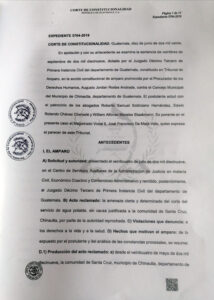
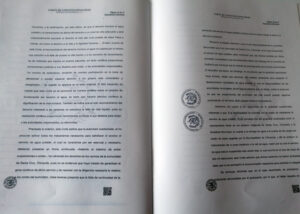
In July 2020, the Constitutional Court declared that the District of Chinautla should provide uninterrupted drinking water service to the indigenous Poqomam people of Santa Cruz, Chinautla. On march 7 of this year, with tears in their eyes, after two years of fighting for the recognition of their right to water, Don Efraín, Aracely, Alicia, Juan Lazaro and other people in the community celebrated the sentence issued by the Constitutional Court, proof of having won a lawsuit against the municipality of Chinautla. They gave a speech in the park and afterwards, with social distancing, they enjoyed their traditional dish, pinol, and regained strength to continue, until the sentence was fulfilled.
El Salvador and its projects in Nejapa
In the last three years the Ministry of Environment and Natural Resources (MARN) has approved 27 construction permits in Nejapa, all with water requirements, according to the Office of Information and Response (OIR), six of them were granted under the category of “no environmental impact study requirement.” Among these is a project approved for the Industrias La Constancia (ILC) bottling plant. The OIR was consulted on the case, but did not determine what the permit granted in 2019.
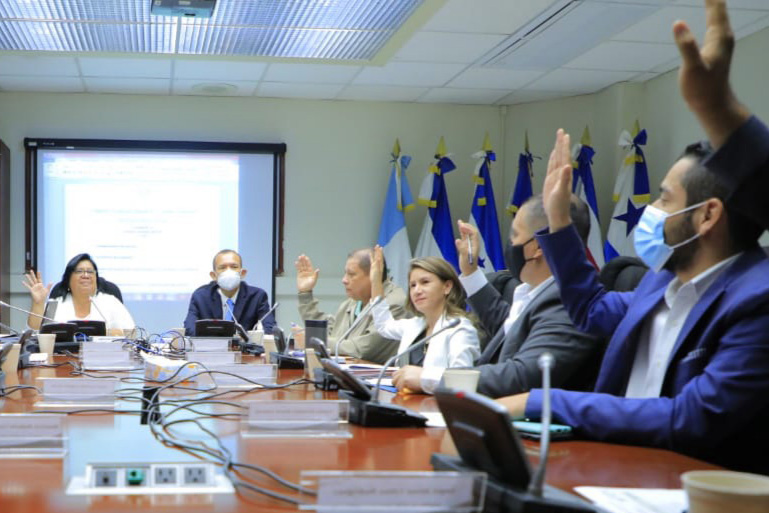
In this list there are only two projects of “Sewage Sewerage System of the municipality of Nejapa” authorized for benefits of the communities and executed by the mayor’s office of the municipality.
According to the document “NFA-698-2018. Dictamen Técnico de Categorización, no requiere elaborar estudio de impacto ambiental del proyecto Refresca,” issued by MARN on August 14, 2018. For the popular soft drink alone, ANDA would be granting REFRESCA the amount of 65,860 liters of water per month, enough to meet the daily needs of 658 people, according to estimates by the World Health Organization (WHO) which establishes an average of 100 liters of water per person per day.
In the last five years, MARN has not registered any authorized projects related to potable water distribution.
For the past 10 years, urban construction in Nejapa has grown and in doing so has disrespected Decree No. 6 “Guidelines for environmental zoning and land use for the municipality of Nejapa” by building in protected areas or areas of maximum protection where water is extracted from the aquifer.
Heidi Guerrero, inhabitant of Las Marías 2, assures that the water problems began with the excessive construction in Nejapa and because ANDA prefers to give the water to private residential areas rather than to the rural communities: “It is very unfair because we are really rich in water as a municipality of Nejapa, but they have always pushed us aside and waste the water. It’s all because they (ANDA) negotiate our water with the private neighborhoods and big businessmen.”
A 15-year struggle
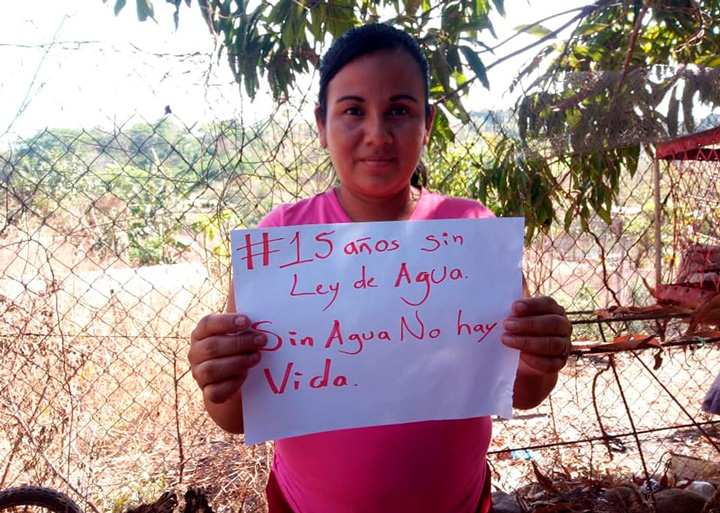
There are groups of people living without water for 15 years.
Since 2006, different organizations have pointed out that if there were a Water Law, this inequality that Guerrero denounces would not have a chance. However, the issue of the approval of a law has had ups and downs in the Salvadoran plenary.
The Vice Rector of Social Projection of the Universidad Centroamericana José Simeón Cañas (UCA), Omar Serrano, assures that the interests of private enterprise in water management and two different positions have prevented its approval: “One that says that the governing body should be eminently public and another position that says that water should be managed efficiently and that private enterprise should be in charge.”
It seems that this point has already been resolved. On June 18, the Executive sent a new proposal to the Legislative Assembly entitled Water Resources Law in Article 4 declares water as “a national good of public use,” therefore, “the State is responsible for the regulation, integral management and administration of water resources.”
Article 10 of the document defines the Salvadoran Water Authority (ASA) as the “superior, deliberative, governing and normative body in matters of water resources policy.” It also establishes that “it will be an autonomous official institution” in terms of administration, budget and financing, but will be attached to the Executive through the MARN. The bill does not contemplate the participation of private enterprise in the board of directors or decision making, nor is there any article that refers to ANDA’s participation.
Article 18 establishes that the ASA will be formed by a president, appointed by the Executive, a representative of the Hydroelectric Executive Commission of the Lempa River (CEL) and of the ministries of Environment, Agriculture and Livestock, Tourism, Housing, Health, Government, and a representative of a Drinking Water and Sanitation Authority, which could substitute ANDA, a representative of the public and private universities and another of the civil society.
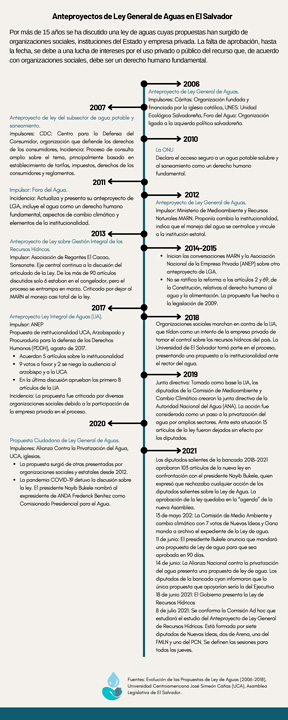
It is not a new proposal
ARENA deputy, René Portillo Cuadra, assured that the proposal of the Executive is not new because 40% are “articles that were presented in the 2012 bill”, he said that 27 articles are exactly the same. The parliamentarian pointed out that the novelty is that it is not only a water law “but a law for the administration and protection of water resources in general terms.” However, he considered that the bill does not have an article regulating consumer protection: “There is no article or adequate protection for the user and consumer of drinking water. The normative body in which should be regulated not only the obligation of the State to provide accessible, affordable and good quality water, has to have a development that it does not have.”
Ricardo Navarro, president of the Center for Appropriate Technology (CESTA), also agreed in saying that it is not a new proposal, but it leaves the door open “for the excessive and abusive use of water resources and this must be controlled”. Navarro presented another law proposal to be added to the discussion: “Security to the water resource, making it sustainable and guaranteeing that all the population has access to drinking water.”
For now, there are three new initiatives in the plenary, the Executive and the proposal presented on June 14 by the National Alliance against the Privatization of Water with a human rights and citizens’ approach. This initiative has the support of ARENA, the FMLN, Vamos and Nuestro Tiempo. Nuevas Ideas refused to support the proposal.
On June 11, President Nayib Bukele announced that the proposal would be approved in a period not exceeding 90 days, it has also been informed that it will be analyzed by an unpaid commission. Considering that the government party in congress represents the qualified majority and has approved laws the same day they reach the plenary, it is credible that in the next few months El Salvador will have a legal framework regarding water administration.
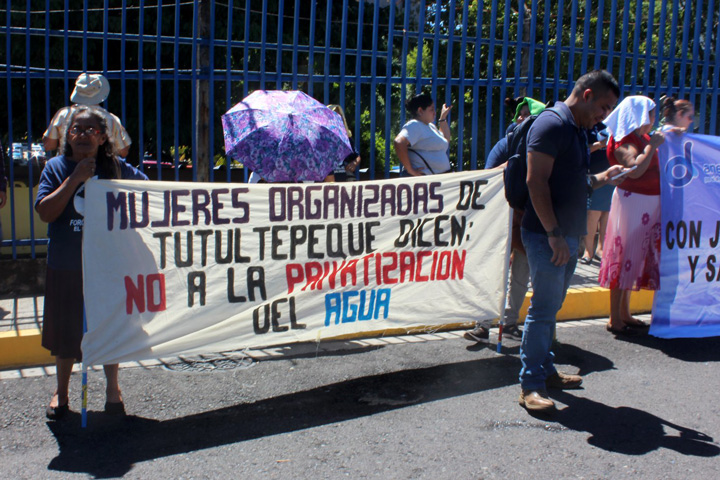
Is it advisable to pass a law?
The idea produces distrust and questions from the actors who have fought for years for the approval of a law because it is unknown if it would fulfill the objective that has always been sought: to guarantee water as a human right and that benefits the majority, being these a priority.
For Omar Serrano, the discussion of a new law leads to the “spiral” with which they have been working and would lengthen the process once again, he maintains that the proposal must contemplate five essential points to be considered a law in benefit of the majorities: “The law must have five fundamental and non-negotiable conditions: That it be a law that turns water into a human right, that the governing body of water has to be the state, that it have the hydrographic basin approach, because scientifically it is proven that it is the best approach to manage water, as a fourth point that a principle of citizen participation be implemented and in fifth place that water cannot be an object of profit.”
A survey conducted by the Institute of Public Opinion of the UCA (IUDOP-UCA) in 2020 on the opinion of Salvadorians on the human right to water, found that 99.5% of citizens say that water is a human right. For Serrano “this reflects that technically the entire population agrees that water should be recognized as a human right. Nothing has ever had a greater consensus in this country. Water has no political, ideological or religious color, and I can say the same about the water law.”
This report was produced with the support of the International Women’s Media Foundation (IWMF) as part of its Adelante en América Latina initiative.
